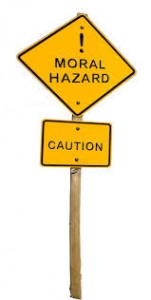We may assume while forming economic models that the market has perfect information, but in the real world there exists a bridge between the information that consumers and producers have. Information asymmetry arises when one party has more or better information than the other party while making decisions and transactions. Accurate information is essential for sound economic decisions. But when a market experiences an imbalance it can lead to market failure.
Moral Hazard is one of the forms of information asymmetry. Moral hazard refers to a situation when the agent with more or better information changes his/her behavior or actions in such a way that benefits him while imposing costs on others. In simple words, it arises when someone with superior knowledge, willingly gets involved in a risky situation knowing that he/she is protected against the risk and other party will bear the loss.
To put it in perspective, let’s take an example of the insurance market. Suppose you have not insured your house from any future damage. It implies that a loss will be completely borne by you at the time of any mishap like fire or burglary. Therefore, to avoid any such incident you will take extra care and attentiveness. You may install fire alarms, hire watchmen etc. But, if your house is insured for its full value, then you have less incentive to spend more on care and attentiveness. Hence the problem of moral hazard arises.
The less care you take, the greater the probability of a theft or fire. Therefore, by taking more risk and thereby increasing the probability of the insured event, behavior of insured person results in huge losses to insurance industry. Moral Hazard is the reason to why insurance companies provide partial insurance rather than complete insurance.
Moral Hazard was described as one of the causes of the 2007-8 U.S. Financial crises. The large banks and financial institutions (which are “too big to fail”) had an incentive in taking unnecessary risk by issuing sub-prime loans because they knew that if anything goes wrong the government will bailout i.e. support them financially in serious crisis. Moreover, both Credit rating agencies and federal policies encouraged banks to allow substandard or less creditworthy borrowers to take loans. But when these households defaulted, consequences were catastrophic. The banks and institutions incurred huge losses and led to the collapse of major financial institutions followed by a financial crisis.
It can be concluded that market policies must be formed by using all the relevant information to get rational outcomes.



16 Comments. Leave new
Well done..Short and sweet
Well written, nicely explained.
Good one!
Thanks 🙂
Well explained:)
Megha, a very good article. Moral hazard is the fundamental psychological reason behind business cycles.
Thanks!
Well written..!
well written.
Thank you!
Well explained Megha..
Very well explained.
Thank you everyone!
Well explained
nice…
very informative !
surprised to know that it was the cause of Financial Crisis !